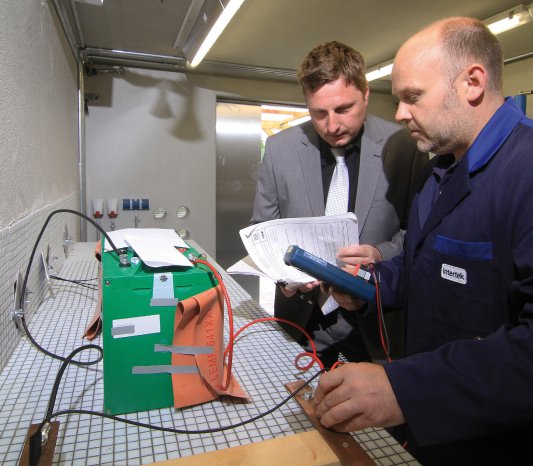Intertek's testing experts can evaluate possible defects ranging from malfunction of the battery systems to the destruction of the Li-Ion brand-name. Applicable standards encompass a wide scope of parameters and range from UN 38.3 to EN 15194, as well as OEM-specifications. The new facility is equipped to carry out safety and performance testing, including mechanical stress testing, temperature stability testing, corrosion testing, electromagnetic compatibility (EMC) testing, and more.
Mechanical Stress testing simulates stress using a shaker to subject the battery and its management system to sine waves, noise and shock impulses. These tests show possible acute weaknesses in the mechanical construction. Using an impact hammer Intertek's E-Mobility experts induce mechanical stress on the battery systems. Similarly, portable batteries are dropped from a measured height on a certain surface. Despite the impact, the battery and battery system should remain undamaged.
The temperature stability of Li-Ion batteries is not only an important criteria for the safety of the battery, but also an important property for the end-user. Rapid changes in temperature place strain on Li-Ion batteries and their management systems. Temperature stress can lead to deformations and tension cracks, and possible disruption of the energy supply. Intertek experts simulate each and every possible external condition during the battery's usage by an end-user to determine the safety and life expectation of the Li-Ion battery.
Simulating the penetration of water and foreign bodies (IP) has always been a part of every safety test for E-vehicles. It often goes unnoticed that users of E-vehicles clean their cars with steam and Intertek realistically re-enacts this in a lab with the IPx9K test. The IPx9K stresses the test object much more than the widely used IPx6 Test. Even though the IPx9K test is not an official part of the safety tests for Li-Ion batteries and their management systems, it should always be a part of the test specifications for E-Vehicles. Furthermore, to test for car safety on dusty roads, the complete battery pack is subjected to an atmosphere of fine dust (Arizona-Dust, particle size 7,5 µm). Through the use of this test it is possible to assess if impurities can make their way through to the battery pack and resultantly affect performance and battery safety.
The new facility is equipped to conduct EMC immunity testing for complete electric vehicle power trains in accordance with the EMC Directive 2004/108/EC, helping manufacturers avoid delays and modifications during the certification of the end product.
Joachim Ihrke, Director Intertek Commercial & Electrical, Germany & Italy, states: "With the wide-spread possibilities of carrying out environmental tests of Li-Ion batteries and their electronic modules in the area of E-mobility at the Intertek Lab at Kaufbeuren, we expand our competence in the European automotive industry - as well as in the services we offer component manufacturers, researchers and developers - to include yet another important segment."


